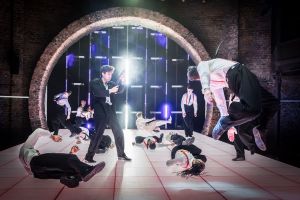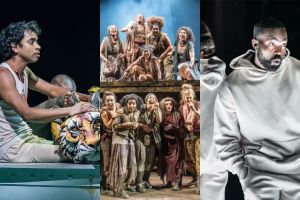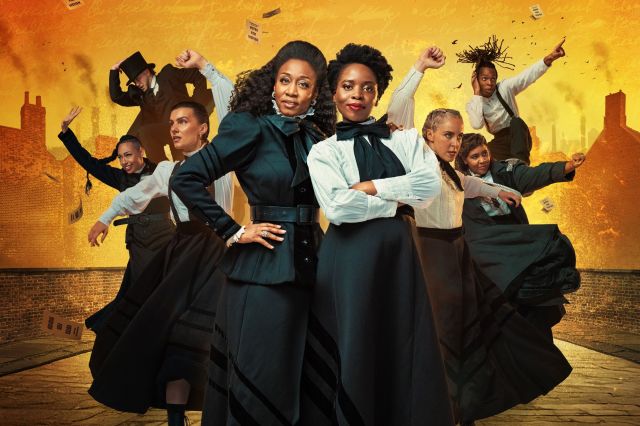20 Questions With…Kathryn Hunter
Actor & director Kathryn Hunter, who leads the Globe’s all-female company in this summer’s productions of Richard III & The Taming of the Shrew, knows how to celebrate the imagination & tap into her testosterone.
After training at RADA, the Greek-American Kathryn Hunter joined the world-renowned experimental physical theatre company Theatre de Complicité with whom, when playing the lead in their acclaimed production of The Visit, she won the 1991 Olivier Award for Best Actress.
Hunter’s CV reads like a who’s who of theatre, listing directors like Nancy Meckler (Mother Courage, Electra, The Hypochondriac), Max Stafford-Clark (The Recruiting Officer, Our Country’s Good), Katie Mitchell (Woman of Troy, Live Like Pigs), Helena Kaut-Howson (title role in King Lear, The Devils) and Phyllida Lloyd.
Her other notable acting work includes Howard Barker‘s Scenes from an Execution for which Hunter was nominated for a Barclays/TMA award, Caryll Churchill‘s Far Away directed by Peter Brook and Lee Hall’s acclaimed solo piece Spoonface Steinberg.
As a director, Hunter’s credits include Mr Puntila and His Man Matti, a co-production with the Almeida Theatre and comedy duo The Right Size, which played in London and Edinburgh before transferring to the West End; Volcano Theatre’s Destination; and Mamaloucos circus troupe’s updating of Aristophanes’ The Birds, which premiered at the National Theatre.
In 1999, Hunter directed The Comedy of Errors at Shakespeare’s Globe, where she’s returned this summer, with her actor’s hat on, to take part in the high-profile “Season of Regime Change”. Balancing out two repertory productions from an all-male company, Hunter leads the theatre’s first all-female company, taking the title role in Richard III and, from August, playing Katherine to Janet McTeer‘s Petruchio in The Taming of the Shrew.
Date & place of birth
I was born 9 April 1957. I was actually born in New York to Greek parents, but my twin and I came here when we were about 18 months old. All my education, university and training has been in the UK.
Lives now in…
Islington, north London.
Training
I trained at Bristol University and RADA (Royal Academy of Dramatic Art).
First big break
I guess it was Frederic Durrenmatt’s The Visit with Complicité. I played the main role, Claire Zachanassian she’s called. We opened at the Almeida in a retrospective season and then played at the Riverside and toured extensively before going to Hong Kong, Australia, all over Europe and then we were invited back to the National and then I was awarded the Olivier. I remember, somebody rang me up and said, “you’ve been nominated for an Olivier, it’s in the paper” and I didn’t know what an Olivier was. Much to my surprise, I won it. I was very honoured. An Olivier is a big deal in this country, but the truth is you just have to go on doing your work. It opens other doors, alerts people and is a big boost, but then you have to go back to the drawing board because that’s what it’s about.
Career highlights to date
Oh my god, there are so many. If you open yourself to the possibilities, each job is a highlight, you know what I mean? I loved working with Complicité. When I first joined the company, it was like starting all over again, re-training in theatrical spatial awareness. Complicité is a group of people who believe in telling a story visually and physically and spatially and as an ensemble. They are always prepared to work and focus and devise. I loved that there were no rules about what it was appropriate for you to play, you weren’t typecast. When we did The Winter’s Tale, I was allowed to play the little boy Mamillius and the old shepherd and Paulina. It’s very fun to have that freedom. Playing King Lear was a huge highlight, too. I’d been in love with the play from a very young age at school, having had a wonderful English teacher who was completely impassioned about it and transmitted that. I identified with Lear even then. With his rage, rejection and absoluteness, he’s not unlike a teenager. So when a very wonderful woman called Helena Kaut-Howson proposed me to play the part, I thought it was a mad idea but I couldn’t say no. A bit like now with Richard III; I thought, it’s completely barmy but I can’t say no.
Favourite productions you’ve ever worked on
There’s Spoonface Steinberg, Lee Hall’s play about an autistic child. I’d commissioned the writer Lee to adapt Brecht’s Mr Puntila and His Man Matti, and after that, I asked him what else he’d written. I did a huge amount of research into autism, which was a great eye-opener. As with all kind of differences, it’s not so much ‘us and them’ as it is walking a line and where you are on that line. I think we all have elements of so-called autism – you know, repetitive movements or rocking or going into another world sometimes, the way we walk up and down when we’re angry. An autistic child will take that even further and make it an absolutely rigid pattern to the point where it’s difficult to have contact. It’s still a mystery as to whether autism is to do with chemical imbalance or genetics or whatever. Also, playing a child, you realise how old and crinkled you are. I wouldn’t want to be young again but it’s a wonderful journey to go there. There are many other favourites. I loved an early experience with Moliére, The Hypocondriac, in which I played the two daughters. I adore comedy. I love the way Moliére holds up the human condition and looks at our foibles, our cruelties, our superficialities and our obsessions and asks us to laugh at the ridiculousness of them. I also loved working on Tennessee Williams‘ The Rose Tattoo and directing Mr Puntila, another fantastic adventure.
Favourite co-stars
Everyone becomes your favourite actor at the time you’re working with them. You just become a family. That’s how it currently is with the women’s company at the Globe. They are all my favourites.
Favourite directors
Again, it’s a kind of feast of plenty. Peter Brook is an extraordinary master. The last time I worked with him I asked what he meant by the ’empty space’. It’s a stripping away. You don’t think, what if your character moves like this or says this in a particular way or has a funny nose, big shoes, external things? He makes you take that all away and ask, what’s the essence without all the paraphernalia? Simon McBurney is a genius of theatre architecture. I don’t mean in terms of set, I mean in terms of rhythm, in terms of space, in terms of the number of performers. Simon has an unerring and brilliant instinct, and he’s a wonderful tyrant, bold and brave and brilliant, his ideas explode onto the stage. I love Anne Castledine for her intellectual, political rigour and her emotion. Helena Kaut-Howson is like quicksilver, mercurial and seemingly eccentric but actually very deeply rooted and passionate and, again, with a very strong visual sense. She’s a kind of soul figure. Who else? Marcello Magni is a genius for telling a story physically, he works in a way that transcends language; Katie Mitchell is immaculately rigorous with her in-depth exploration and her sense of relationships; and Max Stafford-Clark is a joy to work with. Really, it’s a joy working with so many different people’s methods.
What’s your own approach to directing?
I don’t have a family of my own; when directing, you certainly do get that kind of doting parent thing, it’s just a brilliant feeling. And a huge responsibility. You wake up and think, right, who needs what today? That must be the nearest thing to parenting. Directing is about suggesting, releasing, realising what’s already there and alleviating the fear, clearing the playground of obstacles. And then, of course, having a vision. I think very much in pictures when I read a play. So you come with those pictures to the actors, and then other pictures develop and you play with the actors in developing the piece. I enjoy directing, but I’m quite good at taking my director’s hat off, too. When I worked with Howard Barker, I think he was a bit worried about that. I believe all actors should be alert to the whole piece and not kind of buy into this ‘this is my part and I’m only interested in my part’. You have to see the function of your role in the whole and propose directions as well. You can’t just wait for a director to speak with you. It’s all about give and take. As an actor, I don’t think that’s taking over the directing, I think that’s being creative.
Favourite playwrights
Shakespeare, Moliere, Chekhov, Beckett, Miller, Williams, Churchill, Barker, Mamet and on and on. Since I’m working with Shakespeare at the moment, he’s front of mind. Shakespeare was extremely insightful, particularly in the canny contradictions that he makes. With Richard, for example, people go, oh well he’s a straightforward portrait of someone who’s an out-and-out evil mass murderer. Then you come to play it and you realise that’s not the case at all. Other characters in the script say Richard’s murderous, cruel, immoral, brutal, he’s a misogynist, a sadist, a tyrant, a murderer. Another list of descriptions might go: he’s a great lover of mischief, he’s a genius in his quick-wittedness, he has a sense of humour, great sexuality and a delicious sense of self-irony. But I think the big redeeming thing about Richard, the thing that I most identify with and that I hope other people identify with, is the anarchist in him, this tremendous life-force that says, I won’t give up. Shakespeare doesn’t give any pat answers. This character is evil and dark but he’s also having fun – that’s an outrageous thought but it’s truthful. We all know the feeling of, “no I won’t do that … actually I’ll do whatever the hell I like”. You enjoy watching and that makes you complicit.
What roles would you most like to play still?
There are always the unknown ones. I’d love to work with Mike Leigh again and Peter Brook has invited me back, and something with Simon – in a devised piece, you never know what you’re going to be playing. I suppose, because I’m thinking Shakespeare, I’d also quite like to do Henry VI, Part III.
What’s the best thing you’ve seen on stage recently?
Theatre isn’t just about staged productions, it’s about specific moments when people really engage. I was watching some children the other day who were absolutely captivated by a street performer posing as a moving statue. That’s theatre too. In terms of great classical roles, Mark Rylance is wonderful in Richard II here at the Globe. His performance is very accessible. You go along with him on the journey, from moment to moment, as he asks questions of himself. His is the most extraordinary death I’ve ever seen on stage. You can almost see his spirit being released.
What would you advise the government to secure the future of theatre?
I would ask that the theatre is subsidised adequately in order to nurture talent and skill, so that artists feel like artists rather than like scroungers and vagabonds. Theatre offers debate, celebration, community and we do need it. The other thing I’d ask is that they see it as an art form, not an elitist activity. When there isn’t enough subsidy, there is that culture of elitism – ticket prices go up, and more and more people are excluded, and it’s a terrible shame. Theatre is for everyone so we have to keep prices low.
If you hadn’t become a actor, what would you have done professionally?
When I was at university, I thought I was going to be a simultaneous French interpreter.
If you could swap places with one person (living or dead) for a day, who would it be?
Albert Einstein, to see what it feels like to be a genius! And to have extraordinary mathematical skills, which are the greatest mystery to me.
Favourite books
I love the great classic, George Orwell’s Animal Farm. And every book by Krishnamurti.
Favourite after-show haunts
At the moment, it’s the Easy Beaver, which is a kind of shed at the back of the Globe.
Why did you want to accept your parts in Richard III & The Taming of the Shrew?
Because Mark Rylance offered and I couldn’t say no, it was too crazy an idea. So I just said yes, and then it was too late to retract! Also, I wanted to do it because of the all-female experiment. I love experimenting. It’s an adventure.
How do you play a man like Richard convincingly?
He does have very high testosterone – he likes to fight and loves war, he’s quite macho. So I have to keep checking that I’m not thinking like a woman and instead attend to that mentality. You look at the mentality and then translate that into physical action.
What new light do you think all-female casting sheds on the plays?
It brings to the play the unlimitlessness of the imagination. Why not have women? If we as actors can imagine ourselves into these roles, why can’t the audience? I think it’s a celebration of the imagination, of the absence of boundaries within our conscience.
Does the single-sex dynamic differ from other companies?
I can’t pretend I’ve noticed any difference. You know, once in a while you notice that Barry Kyle (the director) is the only male in the room, but not that often really. We just get on with the work.
What’s your favourite line from Richard III?
Richard’s mother, the Duchess of York says: “Why should calamity be full of words?” That line encompasses one of the thousand-fold contradictions in Shakespeare. He knew words so well and had given us such beautiful writing about calamity, about loss, about war. Then we have this character saying, why do people speak of war? What’s the point of words? Only a genius could have that power to express and then ask, why should we say anything at all? I just love that contradiction. It’s brilliant.
Do you find it difficult playing Richard III in rep with The Taming of the Shrew?
We’re just starting rehearsals for The Taming of the Shrew. I’m looking forward to performing both. The last time I did rep, it was with a Greek tragedy and Moliére. It’s great to play tragedy and comedy together. And we’re joined by the brilliant Janet McTeer, of course, so that’s wonderful. It is hard playing in rep – you have to take your vitamins and keep your energy up – but it’s fun. Of course, with a role like Richard, it’s not like it’s ever ‘in the bag’; every performance you discover new things. I think one will feed off the other if I keep alive to it.
– Kathryn Hunter was speaking to Terri Paddock
Richard III opened at the Globe on 11 June 2003 (previews from 25 May) and continues in repertory until 27 September. The Taming of the Shrew opens 21 August (previews from 10 August) and continues to 28 September.












